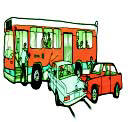Triage (pronounced `tree-ahz'), is
a French word used in the first aid and medical contexts to
indicate the sorting and classification of casualties, and the
establishment of treatment priorities. It usually refers to a
mass casualty situation, such as an earthquake or bus accident.
Even though triage generally applies to large numbers of
casualties, it is also relevant to other first aid situations
involving two or more casualties.
 There are
times when members of the public, trained in first aid, have had
to make decisions on the treatment and care of casualties which
normally would have been the responsibility of ambulance
officers or a doctor. This is especially relevant in country
areas where medical aid may be some hours away. A common example
of this circumstance is when a member of the public travelling a
remote country road comes across a motor vehicle accident
involving several casualties.
There are
times when members of the public, trained in first aid, have had
to make decisions on the treatment and care of casualties which
normally would have been the responsibility of ambulance
officers or a doctor. This is especially relevant in country
areas where medical aid may be some hours away. A common example
of this circumstance is when a member of the public travelling a
remote country road comes across a motor vehicle accident
involving several casualties.
Unfortunately, to effectively
provide the best treatment for the most needy, some seriously
injured casualties may have to be temporarily ignored.
Basically, the requirement is for
your limited first aid resources to be given to the casualties
who will survive because of it, and not to those who are likely
to die.
To triage an incident, your
approach has to be objective - who needs treatment to save their
life? Who will really benefit, and who won't? If I treat one
person, will others suffer seriously from lack of attention? To
assume the responsibility for these decisions is an unenviable
position to be in.
DRABC, control of severe bleeding,
treatment for shock, and treatment for burns, are still the
priorities when attending multiple casualties with little, or no
assistance.
Casualties in cardiac arrest are
only given CPR if there are no other seriously injured
casualties requiring life-saving treatment.
If you become concerned with a
casualty in cardiac arrest, you will be fully committed
performing CPR (usually to no avail), at the expense of another
who may be saved by your active intervention.
An unconscious casualty on his
back, a person with severe bleeding, a casualty with a head
injury going into shock - all are high priorities because
without your intervention they may die. A conscious casualty
with a fractured leg is less urgent and can wait until the more
serious casualties are dealt with. A conscious casualty walking
around, complaining of a sore shoulder, for example, is at the
bottom of the triage list.
The most knowledgeable or
experienced person present should undertake triage.